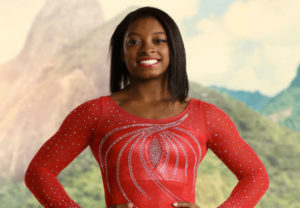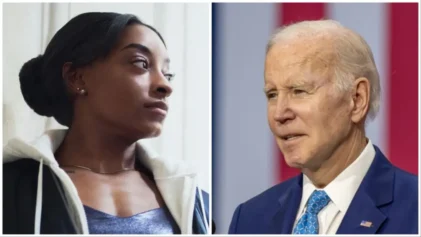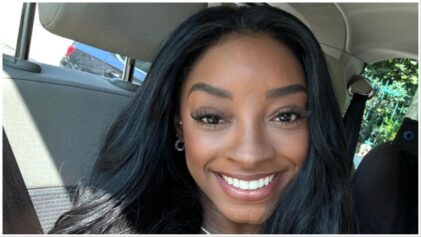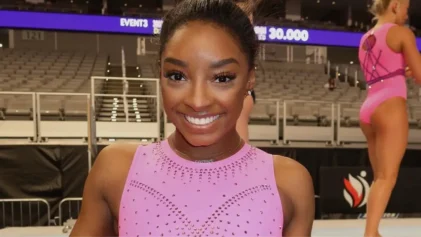
Ahead of her expected turn at the 2016 Olympic Games in Rio, Brazil this summer, Simone Biles is getting candid about her view of race as a gymnast. The three-time world champion reveals her Blackness is not something she has focused on growing up, a product of her upbringing by her grandparents.
The 19-year-old athlete told The Undefeated she has never faced problems because of her race. Her grandfather Ron – who with her grandmother Nellie adopted Biles and her sister when she was 6 – revealed that some see her as “an inspiration for the African-American community. I’m not sure Simone sees it that way.”
Biles says she is happy that she inspires other girls of color, but admits “to me, I feel like I’m just Simone.”
“I never think of it as, ‘Oh, I’m the first African-American to win [the world championship],” she continued. “Everyone just shoves that in our heads. I never think, like, ‘Oh my gosh, I am the first this, I’m the first that.’ I just do my gymnastics because I like to have fun. I don’t bring race into it.”
Race may not have been a factor to Biles when she won a bronze medal at the 2013 world championship on the balance beam in Belgium, but it was a factor for Italian gymnast Carlotta Ferlito. The Italian gymnast told a reporter at the time, “I told [teammate Vanessa Ferrari] that next time we should also paint our skin black so then we can win too.”
The comments were later poorly clarified by the Italian federation. They claimed the gymnastics trend was “going toward a technique that opens up new chances to athletes of color, well-known for power while penalizing the elegance typical of Eastern Europeans.”
Though they both apologized later on, word reached Biles on Twitter. Initially the Columbus, Ohio native thought the story was made up. Then she ignored it. She said the media increased the controversy, but she gave it no thought.
“Fact is, she performed the best at that competition,” Nellie Biles said. “What should matter is the hard work you put in and the performance you put up.”
Biles and her family’s inability to see race contrasts with fellow Olympic gymnast hopeful Gabby Douglas, who acknowledges the increase in diversity in the sport.
“The sport is predominately a white sport, so I’m glad that I’m seeing more African-Americans out there.” she said. “No matter what race you are, no matter what nationality you are, you always should pursue your dream.”
Douglas told “Oprah’s Next Chapter” in 2012 she faced racist jokes in her early years, including one where her teammates called her their slave. She went on to take home a gold medal at the 2012 Summer Olympics.


